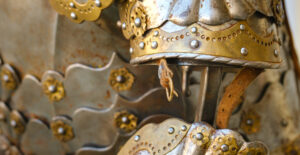
Gold’s importance in Africa transcends its economic worth, holding deep cultural and symbolic meaning across the continent. In many African societies, gold is revered not just as a precious metal, but as a representation of the divine, eternity, and ancestral connection. Among the Akan people of Ghana, for example, gold is seen as the “flesh of the gods,” used in spiritual rituals and shrines to honour ancestors and communicate with the spirit world.
Throughout history, gold has been a central feature of African royal and political life. Kings and chiefs in regions such as West Africa have long adorned themselves with gold regalia, crowns, staffs, and jewellery, signifying power, legitimacy, and a connection to sacred authority. The famed Golden Stool of the Ashanti people is a prime example, it is not merely a seat but a sacred symbol believed to house the soul of the nation itself.
Gold also functions as a social marker, woven into the rites of passage and everyday identity of many African communities. It plays a vital role in weddings, inheritance customs, and status displays, often passed down as heirlooms through generations. Across cultures, from Ethiopia to Senegal, gold is embedded in the fabric of communal and family life, used to signal wealth, celebrate life milestones, and preserve lineage.
In many African societies, gold is believed to hold spiritual energy. With the Akan people of Ghana, gold is linked with the divine, symbolising purity and the eternal nature of the soul. It is common to find gold figurines and jewellery used in ancestral shrines or ceremonies designed to communicate with the spirit world.
Gold is also a material through which continuity is expressed. Heirlooms made from gold are passed down through generations, not only as wealth but as sacred conduits of family history. These items are often used in rites of passage, births, marriages, and funerals, connecting the living with their ancestors and affirming communal identity.
Royalty, Status, and Power
 Few materials are as closely associated with African royalty as gold. Throughout history, kings and queens have adorned themselves with gold crowns, scepters, and embroidered robes to communicate authority, divine favour, and wealth. The Ashanti kings of Ghana, for instance, sit upon a golden stool, a sacred artefact believed to house the soul of the Ashanti nation.
Few materials are as closely associated with African royalty as gold. Throughout history, kings and queens have adorned themselves with gold crowns, scepters, and embroidered robes to communicate authority, divine favour, and wealth. The Ashanti kings of Ghana, for instance, sit upon a golden stool, a sacred artefact believed to house the soul of the Ashanti nation.
This association with power extends into contemporary ceremonial life. Chiefs and dignitaries continue to wear gold regalia during official events and festivals. These traditions aren’t simply nostalgic, they affirm political legitimacy and cultural continuity in the face of rapid modernisation.
Goldsmithing as a Cultural Art Form
African goldsmiths have long been revered for their skill. Techniques such as lost-wax casting, filigree, and granulation were developed centuries ago and continue to be practiced, particularly in West Africa. Each piece crafted carries unique cultural meanings, motifs often represent proverbs, ancestral stories, or clan identities.
Markets in cities like Dakar, Accra, and Bamako still bustle with artisans creating intricate gold jewellery, often combining traditional techniques with modern aesthetics. These pieces are more than decorative, they are cultural statements, worn with pride and passed on with reverence.
In many African cultures, gold plays a central role in marriage customs. Brides are adorned in gold jewellery, necklaces, earrings, bangles, symbolising beauty, prosperity, and the groom’s capacity to provide. In places like Ethiopia and Sudan, gold serves as a dowry or part of a bride’s wealth, offering her economic security within the marriage.
These traditions extend to wider community relations. Gold is gifted during naming ceremonies, community festivals, and coming-of-age rituals. It reinforces social bonds, marking moments of personal transition with public celebration.
Gold in Africa is never just a commodity, it is a cultural language, an ancestral link, and a social signifier. Its continued use in rituals and traditions is a testament to the depth of its meaning. As Africa modernises, these cultural practices remain vibrant, affirming that gold is not only a metal of the earth, but also of the soul.



